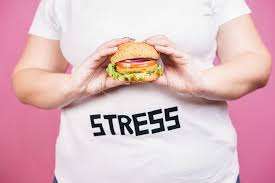Ever had one of those days where everything seems to go wrong, and suddenly, a mountain of chocolate cake feels like the only answer to your woes?
Yeah, you are not alone.
Emotional eating is a universal phenomenon, but it is particularly common—and complicated—for individuals struggling with obesity.
When life’s pressures crank up, many people find solace in food, but how exactly does stress lead to overeating, and why are obese individuals more susceptible?
In this article, we shall unpack the fascinating and frustrating relationship between stress and emotional eating.
From hormones like cortisol wreaking havoc to the psychological comfort of high-calorie foods, we shall dive into the science behind why stress leads to overeating and the implications this has for those who are already battling obesity.
Article Index:
- The Stress-Overeating Connection: An Overview
- How Stress Hormones Influence Appetite
- Why High-Calorie Foods Become a Go-To for Comfort
- The Role of Dopamine and Instant Gratification
- Real-Life Example: Meet Lisa and Her Stress-Eating Struggles
- How Stress Can Be a Double-Edged Sword for Obese Individuals
- Emotional Eating vs. Physical Hunger: Learning the Difference
- What Research Says About Stress-Induced Eating
- Conclusion: Understanding the Emotional Eating Cycle
The Stress-Overeating Connection: An Overview
Imagine you’ are a caveman (or cavewoman), and a saber-toothed tiger is chasing you.
Your body is stress response kicks in, flooding your system with adrenaline and cortisol to help you escape.
In the modern world, our stressors are more likely to be office deadlines than predators, but our bodies still react in much the same way.
When stress becomes chronic, cortisol levels remain elevated, which can lead to increased appetite and, you guessed it, emotional eating.
According to research published in Appetite, stress is a significant trigger for overeating, especially in people who are already obese.
When cortisol floods the system, it signals the brain to seek out rewards—often in the form of high-fat, high-sugar foods.

How Stress Hormones Influence Appetite?
Ah, cortisol, the infamous stress hormone.
When you are stressed, your adrenal glands release cortisol, which increases your appetite and can make you crave calorie-dense comfort foods.
It is like your brain is preparing for an apocalypse, storing up fat because, well, who knows what’s going to happen next?
A study published in The Journal of Clinical Endocrinology & Metabolism found that people with higher cortisol levels are more likely to engage in emotional eating.
The research highlighted that cortisol not only increases hunger but also makes it more difficult to resist high-calorie foods.
The reason is simple: under stress, your brain goes into survival mode.
High-energy foods provide a quick and reliable energy source, which your stressed-out mind interprets as a life-saving necessity.
It is not you; it is your biology.
Why High-Calorie Foods Become a Go-To for Comfort?
Let’s be honest: broccoli and kale don’t exactly scream “comfort.”
When stress hits, most people don’t reach for a salad. Instead, we go for pizza, ice cream, or anything loaded with carbs and fats.
Why?
Because these foods are incredibly effective at boosting serotonin levels, even if only temporarily.
According to Frontiers in Psychology, high-fat and high-sugar foods activate the brain’s reward system, releasing feel-good neurotransmitters like dopamine.
It is like a temporary “happy fix,” which is why stress often leads to a cycle of eating for comfort, followed by regret, and then more stress. Fast foods are laden with calories and this in turn make you fatter.
Think about it: after a long, stressful day, eating a slice of cake feels like a mini-vacation for your brain.
But for someone struggling with obesity, this behavior can be especially damaging, turning into a recurring pattern that makes weight loss even more difficult.
The Role of Dopamine and Instant Gratification
When you eat comfort foods, your brain’s reward system lights up, releasing dopamine, the feel-good neurotransmitter.
The more you eat, the more dopamine is released, reinforcing the habit and making you more likely to turn to food the next time stress strikes.
It is a vicious cycle, particularly for obese individuals who may already have altered dopamine signaling pathways.
A study in Obesity Reviews noted that people with obesity often experience a greater dopamine release in response to food, making the reward more intense and the habit harder to break.
Essentially, food becomes a quick fix, but the long-term consequences are anything but rewarding.
Meet Lisa and Her Stress-Eating Struggles
Let’s put a human face to this phenomenon.
Lisa, a 42-year-old marketing executive, has been dealing with obesity since her late twenties.
Her job is high-pressure, and she often finds herself stress-eating after tough meetings.
“It’s like I can’t help it,” she says. “The moment I feel overwhelmed, I just want something sweet. It is like the food gives me a break from my anxiety.”
Lisa’s experience is a textbook case of stress-induced emotional eating.
The more stressed she feels, the more she craves sugar laden high-calorie foods.
Unfortunately, this only exacerbates her weight issues, creating a cycle that’s difficult to break.
How Stress Can Be a Double-Edged Sword for Obese Individuals?
For people already struggling with obesity, stress is not just an emotional burden—it is a physiological one.
Chronic stress can lead to metabolic changes that make weight loss more challenging.
High cortisol levels promote fat storage, particularly around the abdomen, and can even make the body more insulin resistant.
Dr. Sarah Jenkins, an endocrinologist, explains, “For obese individuals, stress is like throwing gasoline on a fire.
It not only triggers overeating but also alters the body’s metabolism, making it harder to burn fat.”
Emotional Eating vs. Physical Hunger: Learning the Difference
One of the trickiest battles in the war against stress-induced emotional eating is figuring out whether your stomach is genuinely grumbling or if your emotions are just throwing a tantrum.
It is a classic case of real hunger vs. fake hunger, and trust me, they have very different personalities.
Physical hunger is the reasonable, patient friend. It sneaks up gradually, nudging you with a gentle reminder that your body needs fuel. It is flexible, open to negotiation—whether that’s a salad, a sandwich, or last night’s leftovers. It does not demand drama; it just needs sustenance.
Emotional hunger, on the other hand, is the diva of the dining world. It crashes onto the scene uninvited, demanding immediate satisfaction—usually in the form of a triple-chocolate cake or a family-sized bag of chips.
It is not just about food; it is about comfort, distraction, or relief from stress.
And the worst part? It often leaves behind a mess of guilt, like a bad ex who sweet-talked you into bad decisions.
According to Psychology Today, recognizing the difference between these two is the first step toward reclaiming control. Mindfulness practices—like pausing before eating, checking in with your emotions, and savoring each bite—can be powerful tools.
But let us be real: in the middle of a stress spiral, deep breathing does not always stand a chance against a box of donuts. The key is progress, not perfection—learning to swap knee-jerk cravings for mindful choices, one bite at a time.

What Research Says About Stress-Induced Eating?
Scientific studies have repeatedly shown a strong link between stress and overeating.
Research from the American Psychological Association indicates that nearly 40% of adults report overeating or eating unhealthy foods in response to stress.
The numbers are even higher among individuals dealing with obesity, who often have a more pronounced stress response.
One landmark study published in Appetite found that stress not only increases the likelihood of overeating but also makes people prefer foods high in sugar and fat.
This research underscores the idea that stress and emotional eating are deeply intertwined, particularly for those already struggling with weight.
Understanding the Emotional Eating Cycle
So, there you have it. Stress triggers emotional eating in obese individuals through a complex interplay of hormones, neurotransmitters, and psychological factors.
It is a vicious cycle: stress leads to eating, which leads to weight gain, which leads to more stress, and so on.
Understanding this connection is the first step in managing it, but breaking free from the cycle is another challenge altogether.
This happens when you learn the art of preparing smoothie diets that aid weight loss at home. These do not take up a lot of time and they also help you keep your weight in check without costing a single penny.
In the end, while stress might be an unavoidable part of life, how we respond to it—especially when it comes to food—plays a crucial role in our overall well-being.
References: